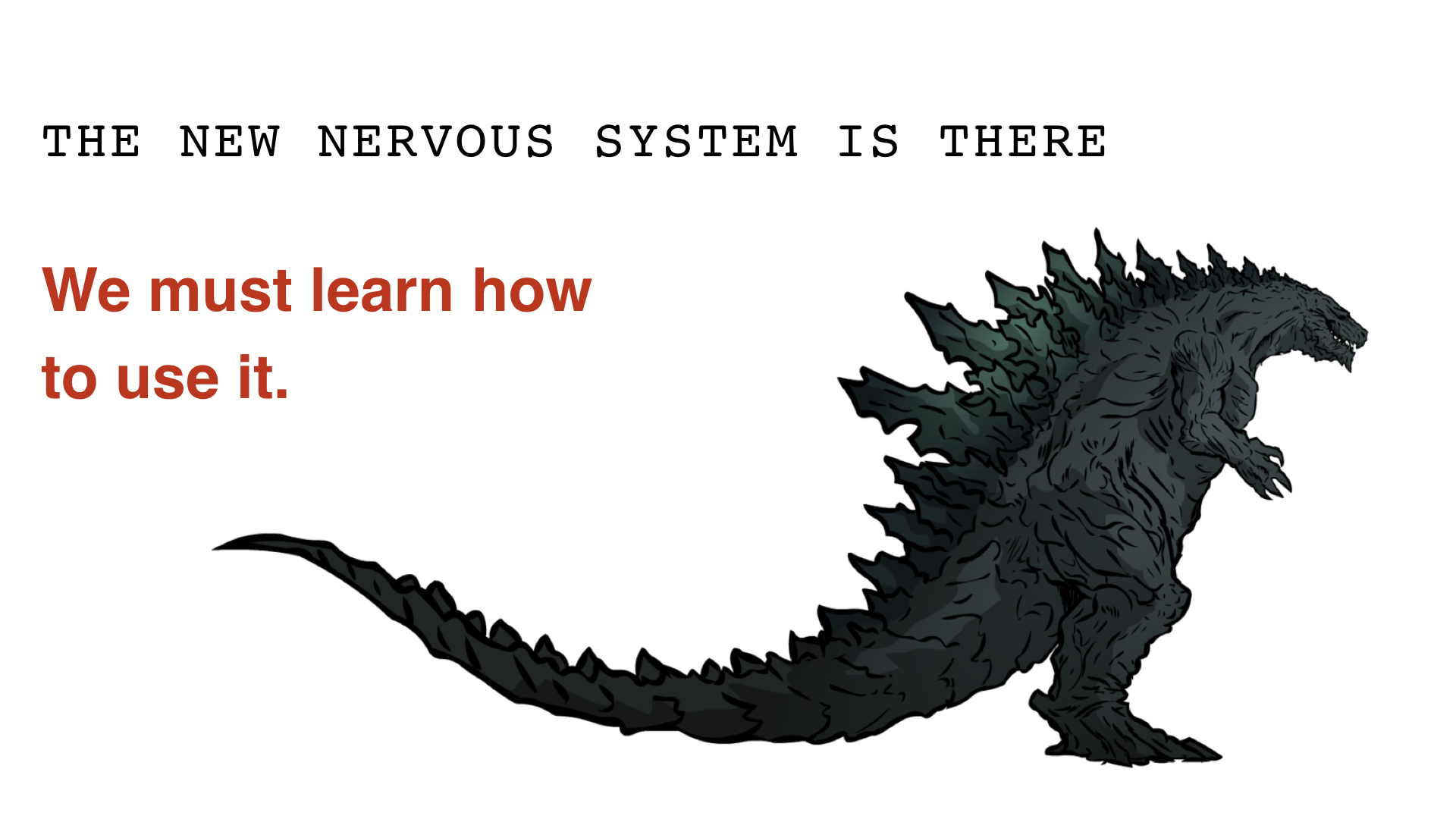Difference between revisions of "Holotopia: Collective Mind"
m |
m |
||
| Line 7: | Line 7: | ||
<div class="col-md-7"> | <div class="col-md-7"> | ||
<p> | <p> | ||
| − | The Internet, the interactive media technology... Isn't that's the most <em>modern</em> part of our civilization? Isn't that what we are most <em>proud</em> of? <em> | + | The Internet, the interactive media technology... Isn't that's the most <em>modern</em> part of our civilization? Isn't that what we are most <em>proud</em> of? We are not comparing <em>that</em> with a pair of handles? |
</p> | </p> | ||
</div> </div> | </div> </div> | ||
| Line 16: | Line 16: | ||
<div class="col-md-7"> | <div class="col-md-7"> | ||
<p> | <p> | ||
| − | + | What is at issue here is the way in which all that fancy technology has been used. More precisely—the very principle of operation of our 'collective minds', which this technology has enabled us to create, by connecting us together in a new way. Is it still using 'fire' (the way of functioning that the printing press as technology made possible); or does it take due advantage of the <em>specific</em> advantages that the new technology has to offer? | |
</p> | </p> | ||
</div> </div> | </div> </div> | ||
| − | |||
| − | |||
| − | |||
| − | |||
| − | |||
| − | |||
| − | |||
| − | |||
| − | |||
| − | |||
| − | |||
| − | |||
| − | |||
| − | |||
<div class="row"> | <div class="row"> | ||
| Line 43: | Line 29: | ||
<div class="row"> | <div class="row"> | ||
| − | <div class="col-md-3">< | + | <div class="col-md-3"><h4>Insight</h4></div> |
| − | <div class="col-md- | + | <div class="col-md-7"> |
| + | [[File:KFvision.jpeg]] | ||
| + | <small>Our civilization is like an overgrown organism, so poorly coordinated that it presents a danger to its environment, and to itself. It has recently acquired a nervous system, which could help its organs coordinate their action; but its cells have not yet learned how to use it.</small> | ||
<p> | <p> | ||
| − | + | Without thinking, we've adopted <em>broadcasting</em> (which suited the old technology) to be the way. But broadcasting leads to collective insanity—not to collective intelligence, as it was intended. | |
| − | < | + | </p> |
| − | |||
| − | |||
| − | |||
</div> </div> | </div> </div> | ||
| + | |||
<div class="page-header" ><h2>Federating the TITLE</h2></div> | <div class="page-header" ><h2>Federating the TITLE</h2></div> | ||
| Line 59: | Line 45: | ||
<div class="col-md-6"> | <div class="col-md-6"> | ||
| − | <h3> | + | <h3>V. Bush – Engelbart</h3> |
| − | <p> | + | <p>The network-interconnected interactive digital media technology, which is in common use today, was <em>created</em> to serve as a <em>collective mind</em> of a new kind—and provide us with the collective capabilities we are now lacking, to be able to tackle our increasingly complex and urgent problems.</p> |
| + | <p>We used this technology to only <em>broadcast</em> information!</p> | ||
</div> | </div> | ||
| − | <div class="col-md-3"> | + | <div class="col-md-3 round-images"> |
| − | + | [[File:Engelbart.jpg]]<br> | |
| − | <small> | + | <small>Douglas Engelbart</small> |
</div></div> | </div></div> | ||
| Line 101: | Line 88: | ||
<p>Text</p> | <p>Text</p> | ||
</div> </div> | </div> </div> | ||
| + | |||
| + | <div class="row"> | ||
| + | <div class="col-md-3"><h2>Myths and Errors</h2></div> | ||
| + | <div class="col-md-7"> | ||
| + | <p>This may be omitted</p> | ||
| + | <h3>"Interesting" means "relevant"</h3> | ||
| + | <p>The myth (analogous to the myth of convenience) that we can relegate the choice of information to what <em>feels</em> interesting or attractive to people. And sidetracking <em>the</em> key question—<em>what should information be like, and how should it be used</em> so that our society, and our democracy, may function.</p> | ||
| + | |||
| + | <h3>"Published" means "known"</h3> | ||
| + | <p>The myth that when something is "published" (by broadcasting), it is automatically "known". </p> | ||
| + | <p>And the closely related myth that the book and the article are <em>the</em> information structuring formats.</p> | ||
| + | <p>Of course, <em>both</em> errors we've simply adopted from the <em>traditional</em> culture—without noticing that the new technology not only enables, but also requires a <em>thorough</em> re-design.</p> | ||
| + | <p>What keeps the contemporary 'Galilei in house arrest' is that (1) his ideas are confined to speculations, imprisoned in an inaccessible language in some inaccessible publication, and (2) lost in the "information jungle".</p> | ||
| + | </div> </div> | ||
<h3>Back to [[Holotopia:Five insights|Five insights]]</h3> | <h3>Back to [[Holotopia:Five insights|Five insights]]</h3> | ||
| Line 117: | Line 118: | ||
</div> </div> | </div> </div> | ||
| − | + | ||
| − | |||
| − | |||
| − | |||
| − | |||
| − | |||
| − | |||
| − | |||
| − | |||
Revision as of 11:11, 15 April 2020
H O L O T O P I A P R O T O T Y P E
Collective Mind
Pitch
The Internet, the interactive media technology... Isn't that's the most modern part of our civilization? Isn't that what we are most proud of? We are not comparing that with a pair of handles?
Scope
What is at issue here is the way in which all that fancy technology has been used. More precisely—the very principle of operation of our 'collective minds', which this technology has enabled us to create, by connecting us together in a new way. Is it still using 'fire' (the way of functioning that the printing press as technology made possible); or does it take due advantage of the specific advantages that the new technology has to offer?
View
Text
Insight
 Our civilization is like an overgrown organism, so poorly coordinated that it presents a danger to its environment, and to itself. It has recently acquired a nervous system, which could help its organs coordinate their action; but its cells have not yet learned how to use it.
Our civilization is like an overgrown organism, so poorly coordinated that it presents a danger to its environment, and to itself. It has recently acquired a nervous system, which could help its organs coordinate their action; but its cells have not yet learned how to use it.
Without thinking, we've adopted broadcasting (which suited the old technology) to be the way. But broadcasting leads to collective insanity—not to collective intelligence, as it was intended.
Federating the TITLE
Stories
V. Bush – Engelbart
The network-interconnected interactive digital media technology, which is in common use today, was created to serve as a collective mind of a new kind—and provide us with the collective capabilities we are now lacking, to be able to tackle our increasingly complex and urgent problems.
We used this technology to only broadcast information!
Story 2
Text
I M A G E
Caption
Actions
Action 1
Text
Action 2
Text
Myths and Errors
This may be omitted
"Interesting" means "relevant"
The myth (analogous to the myth of convenience) that we can relegate the choice of information to what feels interesting or attractive to people. And sidetracking the key question—what should information be like, and how should it be used so that our society, and our democracy, may function.
"Published" means "known"
The myth that when something is "published" (by broadcasting), it is automatically "known".
And the closely related myth that the book and the article are the information structuring formats.
Of course, both errors we've simply adopted from the traditional culture—without noticing that the new technology not only enables, but also requires a thorough re-design.
What keeps the contemporary 'Galilei in house arrest' is that (1) his ideas are confined to speculations, imprisoned in an inaccessible language in some inaccessible publication, and (2) lost in the "information jungle".
Back to Five insights

